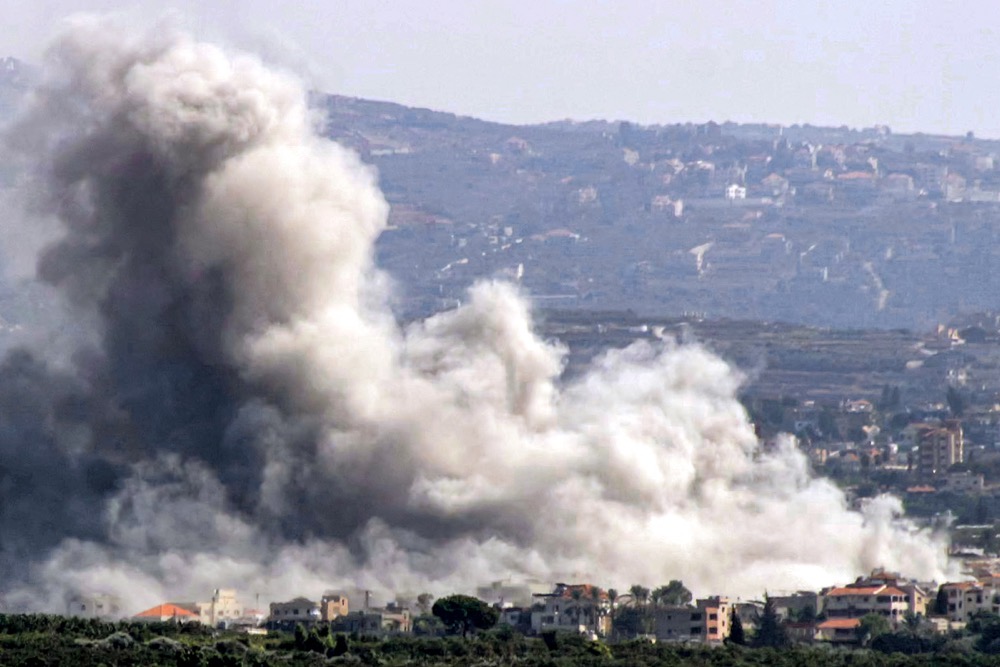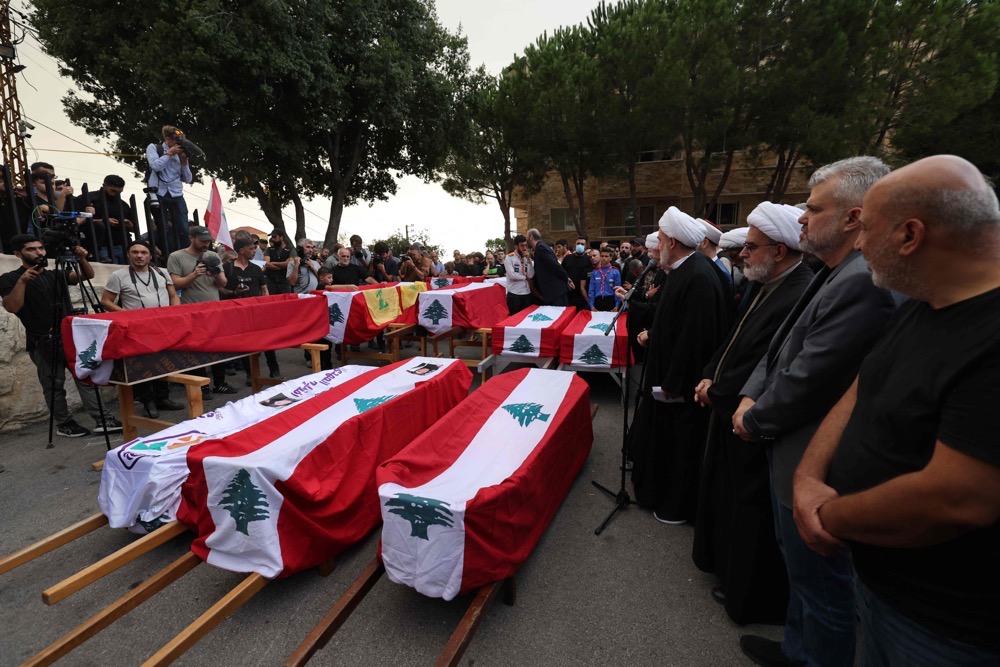LONDON: Israel’s military campaign against the Iran-backed Hezbollah militia in Lebanon has not left the country’s largest Palestinian refugee camp, Ain Al-Hilweh, unscathed, dredging up grim memories of previous attacks and convulsions of violence in the nation’s camps.
On Oct. 1, an airstrike, which leveled four buildings and killed at least five people, marked the first time Ain Al-Hilweh had been targeted since October last year when cross-border exchanges between Israel and Hezbollah began.
The strike was reportedly aimed at the home of Munir Al-Maqdah, a commander in the Al-Aqsa Martyrs Brigades — a coalition of armed groups associated with Fatah, one of the major Palestinian political parties. Early reports indicated that Al-Maqdah was not home at the time, and his condition and whereabouts remain unknown.
Located 3 km southeast of the coastal city of Sidon, Ain Al-Hilweh occupies approximately 170 acres, or 688,000 square meters. According to UN figures, it is the most densely populated camp in Lebanon, housing more than 55,000 people as of 2023.

Smoke rises following an Israeli air strike on the village of Deir Qanoun. (AFP)
The camp was established by the International Committee of the Red Cross in 1948 to shelter refugees, most of whom escaped northern Palestine after the Nakba — the mass displacement of Palestinians following the Arab-Israeli war.
Since its establishment, Ain Al-Hilweh has frequently been a target of Israeli assaults and a battleground for regional rivalries, including between Palestinian factions.
“In a nutshell, Ain Al-Hilweh is the largest camp with an ongoing battle for its control,” Nadim Shehadi, a Lebanese economist and political adviser, told Arab News.

Jasmin Lilian Diab, director of the Institute for Migration Studies at the Lebanese American University, said Ain Al-Hilweh “has long been a focal point for Palestinian resistance.”
She told Arab News: “The camp has evolved into a symbol of Palestinian resilience and resistance, not only against Israeli occupation but also in the broader struggle for Palestinian rights and self-determination.
“The significance of Ain Al-Hilweh lies in its role as a base for various Palestinian political factions and militant groups, including Fatah and others aligned with different political ideologies and resistance.”
In 1974, Israeli jets bombed seven Palestinian camps and villages in south Lebanon, including Ain Al-Hilweh, which suffered the heaviest bombardment. The bombing came in retaliation for an earlier attack by the Democratic Front for the Liberation of Palestine on a school in Maalot, northern Israel.
Less than a decade later, in 1982, during the second invasion of Lebanon, Israel pounded the camp with airstrikes, leaving it almost fully destroyed. The attack took place following an attempt on the life of the Israeli ambassador in London.
Diab said the camp was “a target of Israeli military operations, particularly in the 1970s and 1980s, due to its association with the Palestine Liberation Organization and other militant groups that carried out attacks against Israel.
“The camp has also been a staging ground for armed resistance, drawing attention from both Israeli and Lebanese authorities,” she said.

Mourners attend a funeral for the victims of an Israeli airstrike in the Mount Lebanon village of Maaysra. (AFP)
Israel had justified its invasion of Lebanon in the 1980s on the grounds that Palestinian fighters operating near Israel’s northern border needed to be eliminated. However, after conducting its operations in the border region, Israeli troops advanced all the way to Beirut.
In the aftermath of the invasion, Yasser Arafat, the then-leader of the PLO, was forced out of Beirut. Likewise, more than 2,000 Syrian troops pulled out of the capital, having been stationed there since 1976, when President Hafez Assad intervened to prevent the defeat of his Maronite Christian allies in the civil war.
“After the Israeli invasion and the evacuation of Yasser Arafat from Beirut, there was a gradual attempt by pro-Syrian Palestinian factions to take over and get rid of what was left of Fatah and the PLO,” said Shehadi.
“Syria was finishing the job started by Israel of eradicating the PLO and later, it seems that Hezbollah took over that job. The red line between Syria and Israel was at Zahrani just south of Sidon, below which no Syrian presence was tolerated.
INNUMBERS
• 489,292 Registered Palestinian refugees in Lebanon as of 2023.
• 31,400 Palestinians displaced to Lebanon from Syria since 2011.
(Source: UNRWA)
“The War of the Camps was part of the (broader) battle for Syrian control (in Lebanon), leading to pro-Syrian factions gaining control north of Saida (Sidon), while Fatah and the PLO sought refuge in camps south of Saida, mainly in Rashidieh and Burj El-Shemali.”
The War of the Camps, which took place from 1985 to 1988 during the Lebanese civil war, was an extension of the political struggle between Syria and the PLO. Syria and its Lebanese ally, the Amal movement, sought to disarm Palestinian camps to prevent another Israeli invasion.
After Israeli forces began a phased withdrawal from Lebanon in February 1985, Amal took over West Beirut that April. Amal then besieged and later attacked the Palestinian camps in Beirut, including Sabra, Shatila, and Burj El-Barajneh.
Amal, supported by the government of President Assad, demanded that Palestinian camps relinquish their weapons and hand over security responsibilities to its ranks.
In 1986, the conflict in Beirut spilled over into Tyre and Sidon, where Amal also besieged the Palestinian refugee camps of Rashidieh, Mieh Mieh, and Ain Al-Hilweh and cut off aid, including food and medicines.
Seeking to pressure Amal to lift the siege on Rashidieh, Palestinian guerrillas attacked and captured the town of Maghdouche, an Amal stronghold close to Ain Al-Hilweh. The fighting intensified between Amal and Palestinian groups despite international calls for a ceasefire.

Mourners carry pictures of their relative, Hassan Fadel, who was killed on Saturday in an Israeli airstrike. (AP)
“Ain Al-Hilweh plays a crucial role in the complex relationship between Israel, Lebanon, and Palestinian factions, as well as in the broader Arab-Israeli conflict,” said Diab of the Institute for Migration Studies.
“The camp has also been implicated in regional rivalries, with different Palestinian and Islamist groups receiving backing from various state and non-state actors, further complicating its internal politics and drawing in regional powers.
“In this sense, Ain Al-Hilweh represents not only a physical space of resistance but also a microcosm of the larger Palestinian struggle for statehood, refugee rights, and regional geopolitical contestations.”
Notorious for its lawlessness, Ain Al-Hilweh was not only the site of conflicts with external parties but also a frequent hotspot for clashes between the various armed factions within the camp. “Over the years, it has been a point for internal conflicts between these factions,” said Diab.
In 1990, Fatah, then led by Arafat, gained control of the camp after three days of fighting with the Abu Nidal Organization, which had split from Fatah in 1974.

After the outbreak of the Syrian civil war in 2011, which engulfed the Yarmouk refugee camp in southern Damascus, thousands of Palestinians fled to Lebanon, many of them cramming into Ain Al-Hilweh.
By March 2014, more than 52,000 Palestinians displaced from Syria had sought shelter in Lebanon, according to UN figures.
With even more armed groups now residing in the camp, violence returned in 2017, when Palestinian factions and a Daesh-affiliated militant group, Fatah Al-Islam, engaged in fierce clashes.
Violence between the camp’s Fatah fighters and extremists broke out again in July 2023 and continued until September of that year, claiming at least 30 lives, leaving hundreds injured, damaging infrastructure, and forcing thousands to flee.
Palestinian officials had said street battles started after an unknown gunman tried to kill an Islamist militia leader, known as Mahmoud Khalil, but instead killed one of his companions.
On July 30, 2023, a top Fatah commander in the Palestinian National Security Forces, Abu Ashraf Al-Armoushi, and three of his companions were reportedly slain by Islamist militants.
As the fighting in the camp intensified and stray bullets hit residential buildings in Sidon, commandos from the Lebanese Army were deployed near the camp’s entrance.

A father and his daughter living in a shelter for displaced families wait to receive food aid from “Carneo”, a local restaurant in Beirut. (Reuters)
Najib Mikati, Lebanon’s caretaker prime minister, condemned the clashes and called on “the Palestinian leadership to cooperate with the army to control the security situation and hand over those meddling with security to the Lebanese authorities.”
He also blamed outside forces for their “repeated attempts to use Lebanon” as a battleground for settling scores “at the expense of Lebanon and the Lebanese.”
The violence nevertheless resumed in September, with at least 10 people killed during five days of intense fighting.
Today, as Israel ramps up its assault across Lebanon, residents of the 12 official Palestinian camps in the country fear renewed violence — both from the outside and from within.
Palestinian refugees in Lebanon already experience extreme poverty and face severe restrictions on their movement, employment opportunities, and rights to education and healthcare.
More attacks on the camps, which could trigger fresh bouts of internal turmoil, are likely to worsen their predicament.





























